"The central fact for me is, I think, that the intellectual is an individual endowed with a faculty for representing, embodying, articulating a message, a view, an attitude, philosophy or opinion to, as well as for, a public. And this role has an edge to it, and cannot be played without a sense of being someone whose place it is publicly to raise embarrassing questions, to confront orthodoxy and dogma (rather than to produce them), to be someone who cannot easily be co-opted by governments and corporations, and whose raison d'etre is to represent all those people and issues that are routinely forgotten or swept under the rug. The intellectual does so on the basis of universal principles: that all human beings are entitled to expect decent standards of behaviour concerning freedom and justice from worldly power or nations, and that deliberate or inadvertent violations of these standards need to be testified and fought against courageously."
Edward Said, Reith Lectures, June 1993
Personally, I think that these are the responsibilities of everyone--whether they fancy themselves intellectuals or not.
On a separate note, I came back from my trip with dad to Ireland and England. Oxford's campus was truly gorgeous and made me want to spend much more time than I had with the beauty, history, and art that surrounded me. Trinity College's campus was not as aesthetically pleasing, but the tour given by an eighth year history student (haha, yes, 8) and his retelling of amusing/slightly horrific stories about the professors, students, (e.g. students threw bricks in the windows of a young and apparently widely unpopular college professor (the professors then stayed in the buildings on the campus, which we were standing in front of when this story was told). In turn, the professor decided to bring out his gun and start shooting at them. So of course, the students returned with their own guns...in the end, the professor was very unfortunately fatally wounded in an area where a man really would not want to be wounded. The judge dismissed the students from all charges {which of course had nothing to do with the fact that their fathers were in high places, said our guide sarcastically). They went on to hold high places in Irish government and academia themselves, apparently.) and architecture of the college made it quite an interesting place to visit.
And then there was the Old Library at Trinity College. I wanted to sit there for weeks just to admire the wood and ladders and leather books. There was an exhibition called "Nabobs, Soldiers and Imperial Service: The Irish in India" which displayed many books written by British and Irish with unique perspectives on their relationships with India.

In London, I was able to meet up with some British friends I had made at Manav Sadhna, and the Irish really are the friendliest people on the planet. The greenery in Ireland was breathtaking, and Galway was probably my favorite city. On our first night in Galway, we went to dinner with my dad's colleagues and hosts--an Austrian professor, a German professor, and a French postdoc. Needless to say, the three-hour dinner quite entertaining, with topics of conversation ranging from information technology to healthcare to slums to Chinese infrastructure to, of course, which country is better--Germany or Austria (a topic discussed more and more animatedly by aforementioned professors as the night wore on!).
A 10 day trip was certainly not nearly long enough but alas, I must start classes for my last year at Ohio State after almost nine months away...